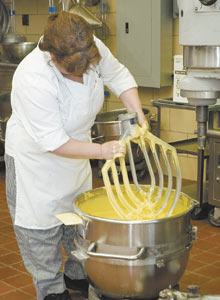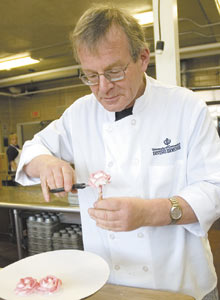  |
| HOME | THIS ISSUE | CALENDAR | GRANTS | BACK ISSUES | < BACK | NEXT > |
University’s bakery keeps campus sweet around the clockby Richard Veilleux - April 17, 2006 |
||||||
|
Robert Min didn’t even blink at the last-minute request for 200 box lunches by the next morning, including two varieties of cookies. After all, what’s a couple hundred large cookies when he and his staff produce more than 2,000 dozen each and every week of the academic year? “We get a lot of last-minute orders,” says Min, manager of the UConn bakery. “There’s a meeting somewhere, a decision is made, and we get a call.” Usually, he says, that call involves a request for cookies or Danish. Lots of them. Min, who came to UConn in 2004, directs a staff of 12, including four who work from midnight to 8 a.m. preparing the daily orders of rolls, breads, and pastries in the 30-foot-square bakery adjacent to the commissary warehouse on Gurleyville Road.
They also get a head start on the dozens of Kaiser rolls produced daily. Once Min and the day crew arrive at 6 a.m., the bakery is set to go. With the ovens already hot, the work begins quickly. Each week, Min says, the crews prepare 1,500 dozen small cookies, and 600 to 700 dozen large cookies – the pre-wrapped chocolate chips and oatmeal raisin cookies faculty and staff find in box lunches. They also bake about 18,000 rolls each week, including grinder and Kaiser rolls; a different style bread for the dining halls every day; coffee cakes, banana bread, and Danish for breakfast; and desserts for dinner – cupcakes, black forest cake, Death by Chocolate, and cobblers, crisps, and pies. They also prepare all the sandwich breads for the coffee shops that dot campus buildings, and all the breads for Chuck & Augie’s. “Last semester, I put 30 new items on the menu,” says Min. “It’s one of the reasons I’m here. To add new things, upgrade the quality.” Dennis Pierce, director of Dining Services, says that’s exactly what Min has done. “Our bakery has always been excellent,” Pierce says, “but Robert has brought that down home cooking to bear. I don’t think you get better baked goods in Boston’s North End than our students receive.”
Min says, “We try to make our products taste like they came from a real pastry shop. Our goals are quality, appearance, and customer service.” The bakery’s customers include not only students, faculty, and staff, but also the University’s nine dining halls, whose staff face thousands of critical students every day of the week. The dining halls are the bakery’s primary customers. “It takes a lot of love,” says Min. “You have to take care of the dough, mix it correctly, make sure it rises and is ready to move into an oven as soon as another set of trays are removed. It’s like a little dance. You have to keep the ovens going continuously.” Min was born and raised in the Netherlands, and earned a bachelor’s degree as a master baker at the School Voor Banketbakkers in Amsterdam. He and his family moved to the United States in 1964, and he has since worked in Delaware, Indiana, and Maryland. After 22 years in the business, he wound up in Colonial Williamsburg, managing the commissary bake shop and producing dozens of fancy breads, rolls, pastries, pies, and more for the hotels, restaurants, and taverns located in and around the large historic village. Then the UConn job opened and, sensing it was time for another challenge, and Min and his wife headed North. At UConn, Min changes the product constantly. He bakes a different cookie for the dining halls every day of the month, for example. Hundreds of recipes are on his computer, where FoodPro software helps him keep track of the ingredient he needs for particular recipes. It also tells the bakery’s main vendor what ingredients must be replaced during the next delivery. “Those last-minute orders can throw it off,” he says, “but we’re fine with that. There’s usually enough stock and they’ll deliver any time we want.” |
| ADVANCE HOME UCONN HOME |


